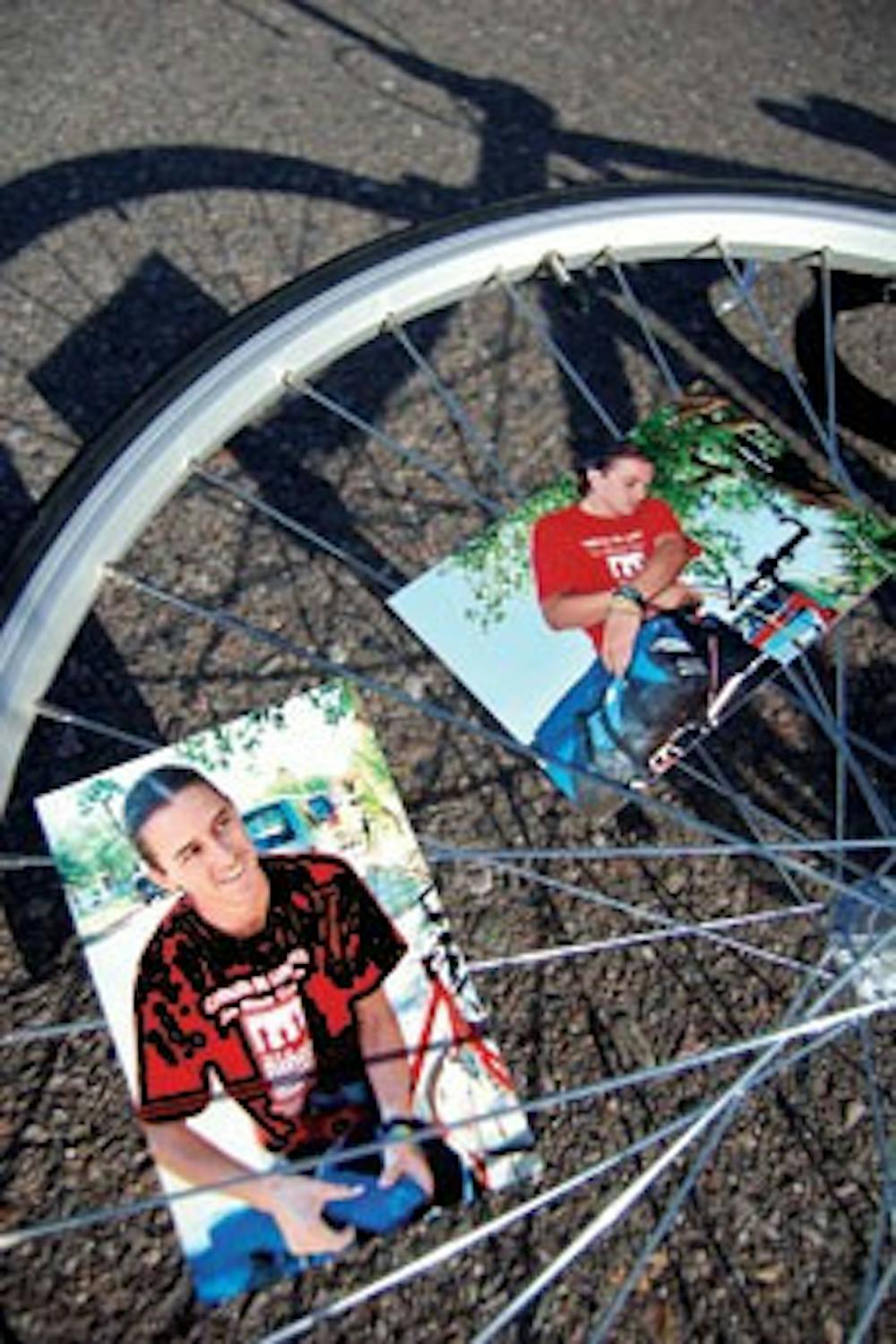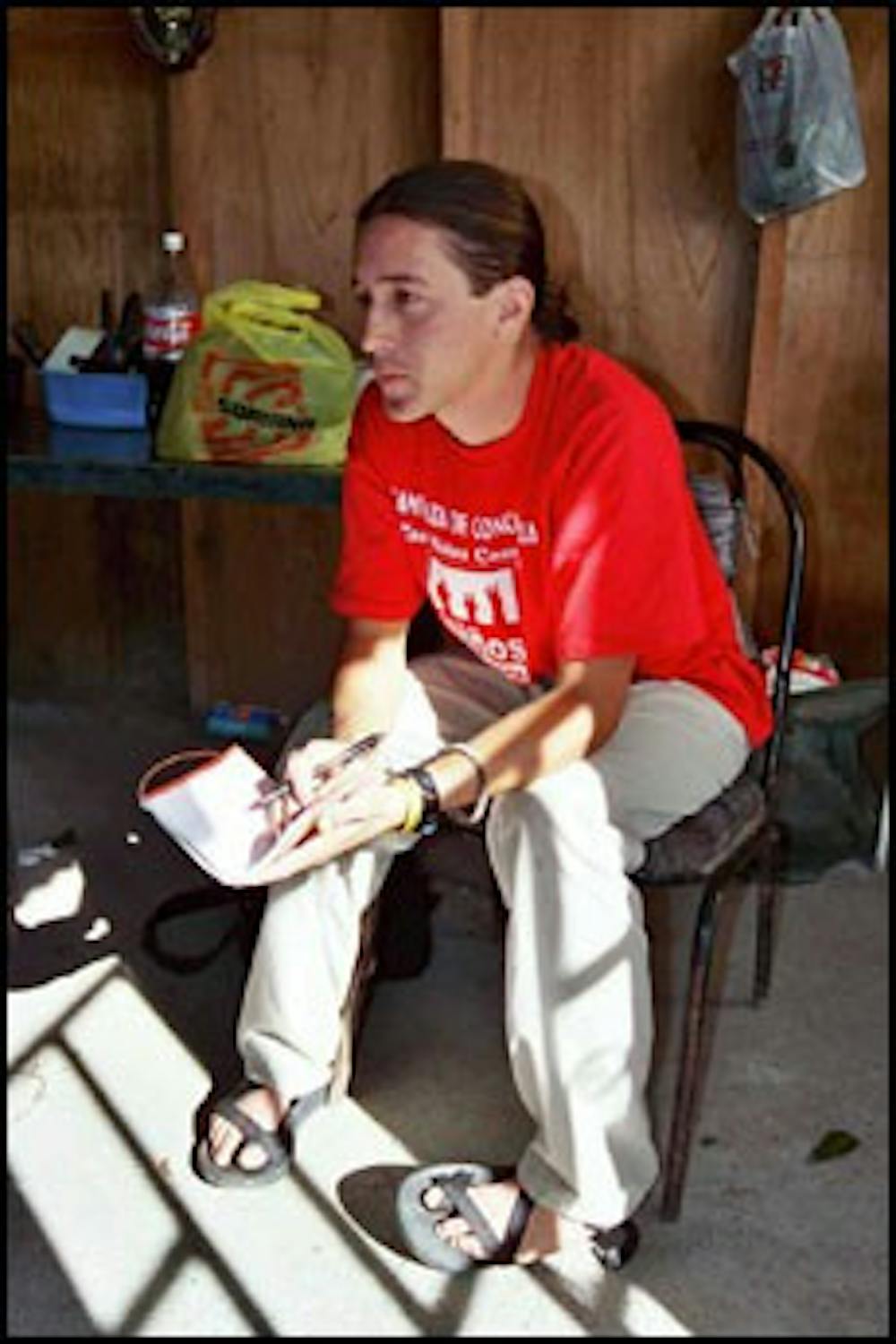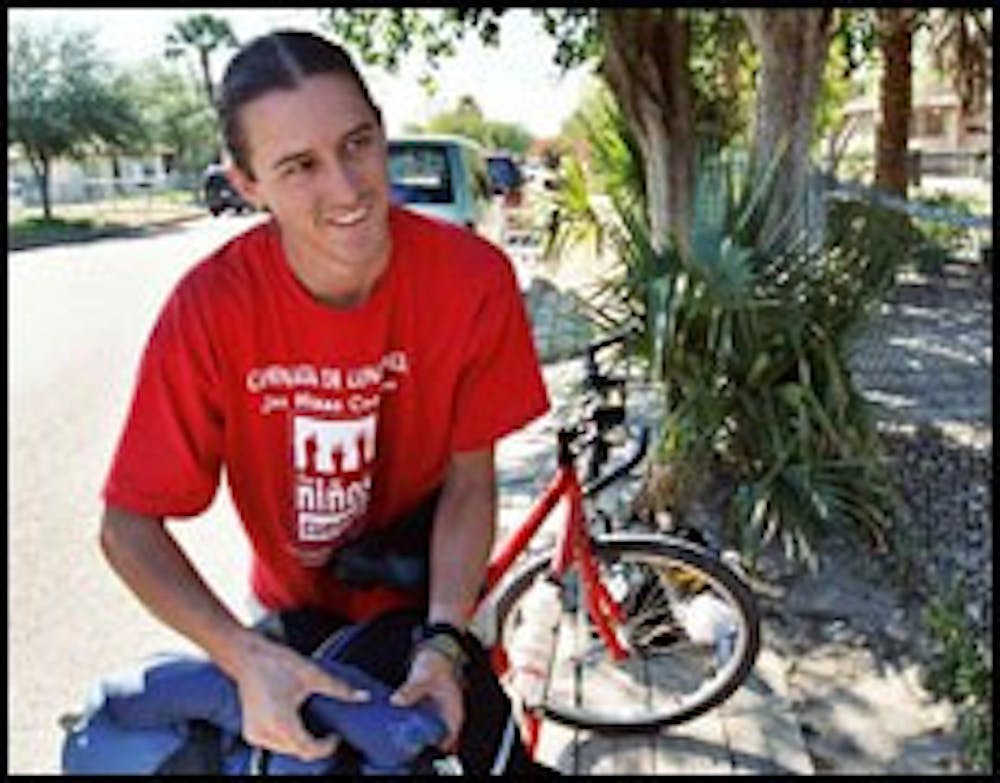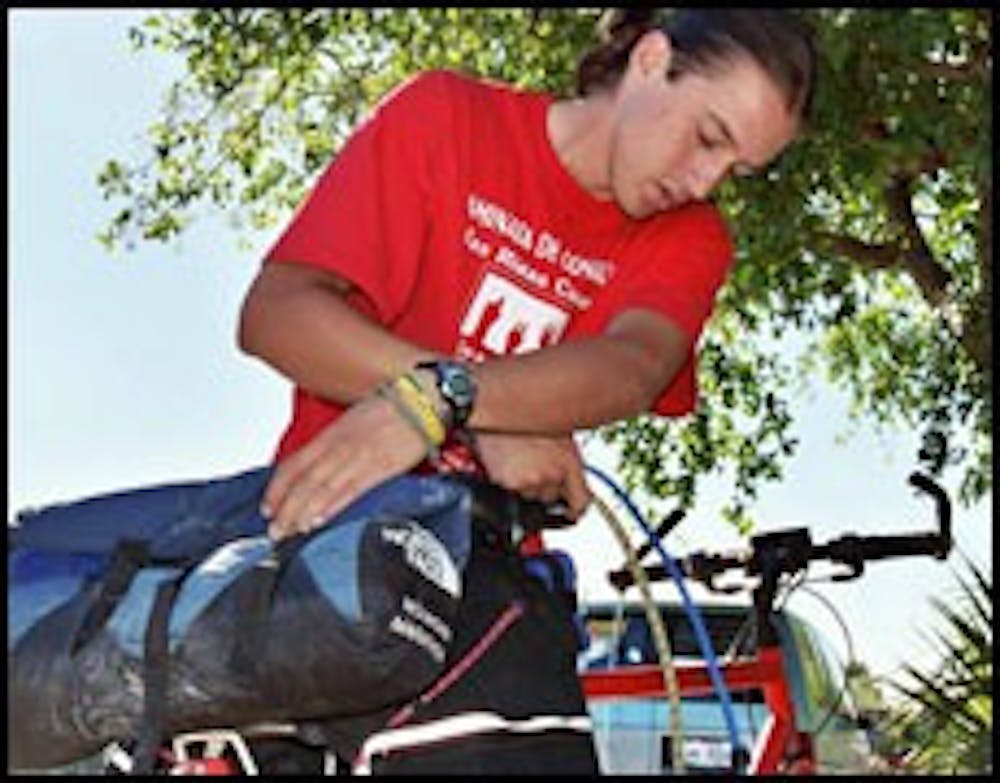As hundreds of thousands of marchers gathered in downtown Phoenix in mid-April to voice their dissatisfaction with anti-immigration legislation, two former ASU students were quietly continuing their own form of protest 30 miles southwest of Tucson.
Ryan Riedel and Ray Ybarra are keeping a close eye on the civilian border watchdogs, the Minutemen.
Both men graduated from ASU with degrees in religious studies, though Ybarra is three years Ryan's senior. Both studied under religious studies professor Ken Morrison, who introduced them last year.
Like many new graduates, Riedel says he was unsure of exactly what he wanted to do. He says it was while he was visiting some friends and working in Cheyenne, Wyo., last year that he met his inspiration in the form of a 23-year-old cyclist who was bicycling his way from coast to coast.
"I recognized my role as a socially responsible and very curious actor in this world," Riedel says. "This was the right time for my social adventure."
Voluntour 1951
Riedel's plan: cycle from Texas to California while stopping in towns along the way to talk to community leaders and activists and learn about the complex issues surrounding the border. He called the project Voluntour 1951, since he was volunteering for a tour along the 1,951 mile-long border.
"People thought I went off the deep end," he says. "I think from the outside it looked like a pretty crazy adventure, and I just did it anyway. The hardest thing was telling my parents about it, easing their anxieties."
Somewhere along the way, Riedel says the trip ceased to be a three-to-four month project.
"I decided to make this project my life," he says. "It's taken an organic path. I need to finish it at some point, because riding my bike too much longer isn't economically feasible."
Riedel says he decided to change the name of the journey from Voluntour 1951 to Border 101, which is also the name of a Web site, www.border101.org, he and some friends created to post his blog and offer links to other border-related Web sites and news stories.
Riedel says he plans to write a book collecting his experiences and the words of the people he meets, in order to help educate people on what makes politics at the border such an intense topic of conversation to both in the public and the media.
Complex History
According to professor Carlos Velez-Ibanez, a book like Riedel's is exactly what the public needs. Velez-Ibanez is the chair of the University's Chicano/Chicana studies department, soon to be re-named the Transborder Chicano/Chicana and Latino/Latina studies department. He agrees that now is the time for research along the border.
Velez-Ibanez says in all the present attention to immigration issues in the government and the media, people are missing out on both the history and causes of illegal immigration.
"People look at the march I attended on Monday, [April 10], and they don't realize that many of us are here legally," says Velez-Ibanez, an eighth generation American whose family has lived in Arizona since the 18th century. "They don't realize that plenty of us here are willing to get arrested every day -- we'll pack their jails. Either this gets resolved now, or the intensity increases."
Velez-Ibanez says projects like Riedel's are important because they offer a chance to solve the primary problem in the immigration debate: a lack of education. Velez-Ibanez says the lack of education is a problem that goes to the state Legislature.
"What these legislators are saying about migrants invading our country is just the height of hypocrisy," he says. "Nine million immigrants pass through the border every year at Tijuana alone."
Velez-Ibanez points to economic reports showing that Phoenix needs 14,000 more laborers than it presently has just to fill the demand for carpentry. He also references a recent New York Times column, "The Wall That Keeps Illegal Workers In," by sociologist Douglas Massey, which claimed the percentage of illegal immigrants in proportion to the United States' total population is no greater now than it was 20 years ago.
Finally, Velez-Ibanez says that both Mexico and the United States' economies are dependent on the migrants, who contribute more than $20 billion to Mexico's economy -- that's more than any export other than oil and tourism. He adds that migrants fill jobs in the United States that wouldn't be filled if they were gone.
"What Riedel needs to do is simplify all of these issues related to the border, and put them in a historical context, so that people can understand it," he says. "People are untutored in these subjects, although some of them are so prejudiced that they could never learn."
Bumpy Road
Riedel's quest for border education hasn't been easy.
For funding, he says he was going to depend on his personal savings and donations from friends and family. Additional funding came by way of the Barrett Honors College and eventually the Cesar Chavez Leadership Institute, which threw Riedel a celebratory fund-raiser during his visit home in December. He says he also sold his truck to help fund the trip.
Things haven't gone exactly as planned. While sleeping during a southward biking trip from Austin, Tex. toward the border, Riedel's bike was stolen. He woke up, caught a ride back to Austin, and started all over again -- this time setting out on a bike he'd built himself, repairing it at the Yellow Bike Project, a bike shop that accepts donated bikes and allows volunteers to repair them. He christened the bike Dudley Docker II and hit the road again.
Despite his lack of economic security as a bicyclist on a ride of yet-to-be-determined length, Riedel says he is not worried by financial concerns.
"I've met plenty of people along the line, and I've actually gotten job offers on the road," he says, listing the offers from various community and union organizations, as well as local publications, which have begun buying some of his freelance writing.
Jobs No One Wants
According to Velez-Ibanez, the economic opportunities available to Riedel offer a stark contrast to those available to people in Mexico.
"I have a compadre in the Sinaloa area of Mexico who used to be a farmer," says Velez-Ibanez. "In order for him to be able to afford the seeds and pesticides necessary to keep the farm running, he had to work three jobs. He worked on a coconut plantation, shaking the coconuts out of the trees; he worked in a broom factory, the most disgusting job imaginable; and he worked in a shrimp lab, cleaning the floors."
In addition, Velez-Ibanez says his friend worked for part of the year in a maquiladora, a Mexican factory typically owned mostly by foreign companies. According to Velez-Ibanez, the standards the factories must meet are much lower in terms of workers-rights and pollution as compared to those in the United States.
His friend finally returned home, he says, but not before dropping off 70 pounds of marijuana to a waiting truck from the United States. After all of this, his friend, whose economic situation Velez-Ibanezsays isn't uncommon in Mexico, would come home with $2,800 to prepare for the next crop.
While Riedel has yet to visit a maquiladora, he says he has seen the impact of factory life on a community in Mission, Tex., where he spent time during the first leg of his travels.
Mission is home to several chemical factories and Riedel says he saw neighborhoods where he could literally go door-to-door and see the spread of cancer, diabetes and birth defects.
"The chemicals were in the fruit they ate, the sprinklers they used and the water they drank," Riedel says. "But I spoke to one woman who still said, 'No matter how bad it is in Texas, it's even worse down in Mexico.'"
Riedel says the families have been in a seven year legal battle with the companies, which deny responsibility, even though government money is currently being used to clean the soil in Mission.
SPM's repeated phone calls and e-mails to several of the chemical companies were unanswered.
Iris Salinas, a member of the Chicano and Latino activist group La Raza Unida who is working with the people of Mission, says she isn't surprised.
"When you're up against 34 of the biggest monster organizations -- I don't really think much is going to happen by way of the lawsuits," she says.
In the meantime, she says, the government has released numerous reports about the chemical contaminants that run 16 feet deep.
"South Texas is part of the United States, but it's also completely separate," she says. "There is no middle class -- you're either really rich or really poor. These factories came and were set up in lower- class Mexican-American neighborhoods and people weren't told what they were doing."
She says Mexican-Americans who live in Southern Texas have no voice in what happens to their communities.
"The federal government has been doing research in Mission for over 50 years, not to help the people, but to use them as a human laboratory," she says. "There have been reports confirming elevated and disastrous levels of chemicals, so they've had plenty of opportunities to do things for the people.
"You don't even see signs about it anywhere in Mission," she says. "People just die."
Death and the Desert
Riedel says none of his experiences on the road prepared him for what he found one weekend in March. While collecting water samples from the Rio Grande river with some college students in Laredo, Tex., Riedel says they found a corpse in the river.
The body, he says, was burned until almost unrecognizable by the sun. He says it was the first time he'd seen a dead body outside of a funeral.
"The sight of him, having read about all these issues involving migrants," he says, trailing off for a few seconds. "Are they drains upon our economies? Are they harbingers of disease? Are they hurting our societies?
"All these questions that people are asking over and over again faded in the face of this guy who had died trying to go no more than fifty yards to try and find some money to send back to his family or create a better life for them. That was really life-changing."
Currently, Riedel spends his days watching Minutemen along the border with Ybarra. The two have a bungalow to return to every night, which he says has offered a different experience from the rest of the journey, when he would ride along the road with two bags filled with the usual things a person carries -- a wallet and cell phone -- in addition to camping gear: a sleeping bag, extra water carriers, a stove, pots and pans, clothes, and his bike repair kit -- he has to fix a flat every four days or so.
Riedel says that the men he and Ybarra watch, members of both the Minutemen and various splinter groups, are disingenuous in the way they present themselves.
"The image that they promote is a bunch of old men in lawn chairs with binoculars and cell phones, but they have a lot more technology than that," he says, citing the rifles, telescopes and ATVs he says he has seen them employ. "They're very aggressive, and there is a potential for violence. They're basically main-streaming hate and nativist attitudes, and what's even worse is some people are buying it."
Riedel isn't the only one who has visited Ybarra to help. Volunteers have been concerned citizens and members of the news media, among others. According to Ybarra, a handful of state legislators have even traveled down to the border to witness migration first hand, including Phoenix representative and ASU professor Kyrsten Sinema.
Sinema, who goes down to the border every weekend, introduced a bill earlier this year that would criminalize the actions of the Minutemen.
"I think the work Ryan and Ray are doing is very important -- they're calling attention to the recipe for violence at the border which our government has never supported," she says.
But according to the Minutemen, the picture painted by their detractors is false.
"It's not about politics," James Wade, a member of Minutemen splinter group, Minutemen of One, says. "I was against [the North American Free Trade Agreement, which many more liberal politicians were also against.] I'm just out there to help enforce the laws."
Furthermore, he says that the portrayal of Minutemen as racist is completely unfounded.
"We have people of all races out here with us," he says. "We even have legal immigrants out here helping to stop the illegal ones. Most often, the people who throw out the race cards are the racists -- they don't know anything about us, about who we are, and they make all these assumptions about what we're doing."
His reasons for joining the Minutemen are strictly personal, he says. The situation at the border hit home when he returned from military service with the Marines and was unable to find a job in construction in Tucson.
"The bank repossessed my home and my truck, and in the meantime more and more bills were stacking up," Wade says. "All while politicians were saying that illegal immigrants were doing the jobs other Americans wouldn't do. Well, they're wrong -- we do them, and we need to do them."
He was forced to live on the side of the river, homeless for a year, he says, before he finally found work.
Wade says that the way major figures who talk about the border -- whether it's the media or politicians -- talk about it as though it were a completely different situation than it is.
"The people at the head of the Border Patrol, they call us vigilantes," he says. "The border patrol agents we meet in the field have, without exception, shook our hands and thanked us."
Border Patrol agents aren't the only ones thanking him, either.
"Usually, the illegals we pick up have been wandering in the desert for days," he says. "We give them food and water while we call Border Patrol, and then they thank us as they're being taken away for saving their lives."
The humane policies of the Minutemen of One aren't universal among border watch groups, he says, but he also says he has never seen any illegal or violent activity directed towards illegal immigrants by Minutemen from any group -- although he says he frequently sees illegal immigrants hurt by the coyotes, the "guides" who accept payment to help people cross the border.
Ybarra says he's never seen the Minutemen perpetrate violence upon any of the migrants they have come across, but that he is still afraid for the migrants who are in the desert.
"I came across a man once who was burnt so black by the sun that you couldn't even begin to guess his nationality," he says. "He was carrying a jug of his own piss that he was drinking from to keep himself alive."
Ybarra says he helped the man with supplies, an act which could potentially become illegal with the passage of legislation such as federal House Bill 4437 and State Bill 2873, which would have revoked access for cities or municipalities that provided aid to illegal immigrants. The threat of imprisonment, though, seems to matter little to Ybarra.
"I'm not worried about being arrested," he says. "I'm worried about where we're going as a society, when we aren't realizing our opportunities as a whole to help other human beings."
For more information on what is happening along the Arizona-Mexico border visit, www.border101.org and www.minutemanofoneinmesa.blogspot.com.
Reach the reporter at benjamin.horowitz@asu.edu.
This story was modified on April 25, 2006 to correct an error regarding the chemical factories in Mission, Tex.







